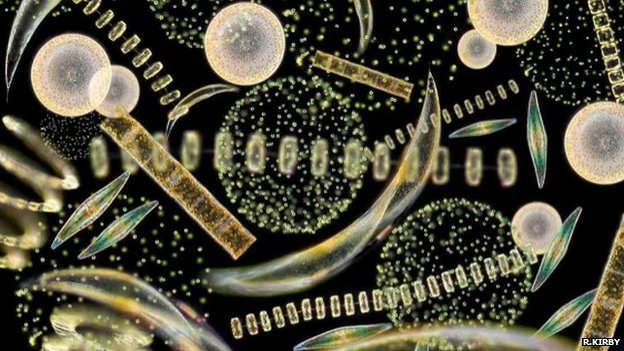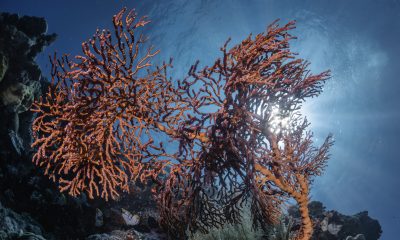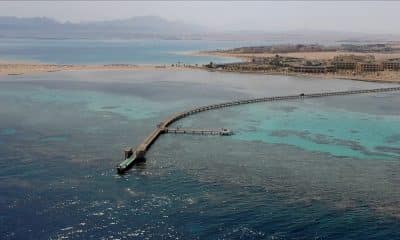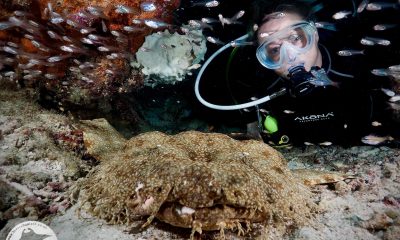Marine Life & Conservation
App Set To Match The Oceans’ Plankton

A study is calling on the world’s sailors to help map the oceans’ phytoplankton, microscopic plants that form the bedrock of marine food chains.
Researchers have developed an app for people to submit readings from Secchi disks – a method used since 1865.
The team hopes the data will help them understand what is happening beneath the waves.
They have been “astonished” by the response so far but are hoping for more readings from the southern hemisphere.
“The reason the project came about was because, in 2010, some Canadian scientists wrote a paper that suggested that the phytoplankton in the world’s oceans had declined by 40% since the 1950s,” explained project leader Richard Kirby, a research fellow at Plymouth University’s Marine Institute.
“If true, this is a dramatic decline. As phytoplankton starts the food chain, they dictate the productivity at every level above,” he observed.
“Ultimately, phytoplankton determines the amount of fish in the sea and the number of polar bears on the ice.”
Marine biologists have been using the Secchi disk method to measure the abundance of phytoplankton for 150 years.
The white disk measures 30cm (1ft) in diameter and is lowered into the water on the end of a tape measure. When it is no longer visible from the surface, the reading – known as the Secchi depth – is recorded.
“It is a very robust method and not prone to error and it is a good measure of phytoplankton abundance,” said Dr Kirby.
“Away from estuaries and more than a kilometre from the coast, the main influence on water clarity is phytoplankton.”
He explained how he had the idea of setting up a citizen science project: “It occurred to me sat at my desk that while there are a lot of scientists, there are not that many that are marine scientists, and fewer still that go to sea.
“And the ones that do go to sea do not go out very far. If they do go out far, they rarely go back to the same place.
“I thought that there are an awful lot of sailors out there; day sailors, cruising sailors. Many of these sailors will sail the same waters and take the same route time and time again.”
Dr Kirby, and colleagues Drs Nicholas Outram and Nigel Barlow from the University’s School of Computing and Mathematics, developed the Secchi Disk App that would store a reading while at sea before uploading it to a database once the smartphone was back within range of a mobile phone network.
“We can now collect Secchi depth measurements from all over the world’s oceans and add that to the data from the 1860s to make a continuous – with a slight dip – record to see what is happening to the phytoplankton in the oceans,” he said.
The database, managed by Dr Sam Lavender, is accessible, free-of-charge, from the project’s website.
The reason for collecting measurements via the Secchi method, Dr Kirby explained, was because the Canadian team’s findings proved to be quite controversial among scientists.
“Some said that they did not see any similar decline, while others said they saw an increase rather than a decline,” he said.
The study was criticised because it combined Secchi disk measurements with data gathered using modern technology that became available to scientists in the late 20th Century.
Despite the criticism, the authors have defended their findings, saying the dramatic decline was a result of sea surface temperature.
“They said that the warming had increased stratification so fewer nutrients were reaching the oceans’ surface, and so there was less phytoplankton growth,” Dr Kirby said.
He added that in the waters around UK shores, observations showed that phytoplankton were appearing at different times of the year.
He said that changes in the seas’ seasons had potential consequences for life beneath the waves.
“This is changing the coupling in the marine ecosystem. Evolutionarily, everything is synchronised – just as it is on land.
“When the timings start altering, even by just a fraction, then things no longer work through the food chain.”
To help raise awareness of the vital role phytoplankton plays in marine and terrestrial food chains, Dr Kirby has written and produced a short film called Ocean Drifters, which has been sent to every secondary school in England.
Narrated by Sir David Attenborough, the film also explains how plankton is responsible for the familiar smell of “sea air”, and how the tiny organisms are involved in the formation of clouds.
Source: www.bbc.co.uk/news
Photo: Richard Kirby
Marine Life & Conservation
Leading UK-based shark conservation charity, the Shark Trust, is delighted to announce tour operator Diverse Travel as a Corporate Patron

 Corporate Patrons provide a valuable boost to the work of The Shark Trust. The Trust team works globally to safeguard the future of sharks, and their close cousins, the skates and rays, engaging with a global network of scientists, policymakers, conservation professionals, businesses and supporters to further shark conservation.
Corporate Patrons provide a valuable boost to the work of The Shark Trust. The Trust team works globally to safeguard the future of sharks, and their close cousins, the skates and rays, engaging with a global network of scientists, policymakers, conservation professionals, businesses and supporters to further shark conservation.
Specialist tour operator Diverse Travel has operated since 2014 and is committed to offering its guests high quality, sustainable scuba diving holidays worldwide. Working together with the Shark Trust will enable both organisations to widen engagement and encourage divers and snorkellers to actively get involved in shark conservation.
“Sharks are truly at the heart of every diver and at Diverse Travel, we absolutely share that passion. There is nothing like seeing a shark in the wild – it’s a moment that stays with you forever!” says Holly Bredin, Sales & Marketing Manager, Diverse Travel.
“We’re delighted to celebrate our 10th year of business by becoming a Corporate Patron of the Shark Trust. This is an exciting partnership for Diverse and our guests. We will be donating on behalf of every person who books a holiday with us to contribute towards their vital shark conservation initiatives around the world. We will also be working together with the Trust to inspire divers, snorkellers and other travellers to take an active role – at home and abroad – in citizen science projects and other activities.”
Paul Cox, CEO of The Shark Trust, said:
“It’s an exciting partnership and we’re thrilled to be working with Diverse Travel to enable more divers and travellers to get involved with sharks and shark conservation. Sharks face considerable conservation challenges but, through collaboration and collective action, we can secure a brighter future for sharks and their ocean home. This new partnership takes us one more valuable step towards that goal.”
For more information about the Shark Trust visit their website here.
For more about Diverse Travel click here.
Marine Life & Conservation
Shark Trust Asks Divers to help with Shark Sightings this Global Citizen Science Month

 Whether you are stuck for ideas of what to do with the kids or are off on the dive trip of your dreams. You can get involved in Citizen Science Month and help the Shark Trust by providing vital data about sharks are rays both close to home and further afield.
Whether you are stuck for ideas of what to do with the kids or are off on the dive trip of your dreams. You can get involved in Citizen Science Month and help the Shark Trust by providing vital data about sharks are rays both close to home and further afield.
In addition to reporting the sharks and rays you see on your dives, the eggcases you find on the beach, the Shark Trust is looking for some specific data from divers who are asked to report any Oceanic Whitetip and Basking Sharks.
Oceanic Whitetip Sharks
The Shark Trust are looking specifically for Oceanic Whitetip Shark sightings over the coming weeks and months. So, if you are diving anywhere in the world, please report your sightings via the website or app.
Website: https://recording.sharktrust.org/
App: Search The Shark Trust in your app store
The Oceanic Whitetip. Known for their incredibly long dorsal and pectoral fins, this species was once the most abundant oceanic-pelagic species of shark on the planet.
Large and stocky, they are grey or brown above, and white below and famous for their huge rounded first dorsal fin and paddle-like pectoral fins. The fins also highly prized within the shark fin trade. Whilst they are mostly solitary, Oceanic Whitetips do occasionally hunt in groups.
An inquisitive species, they were easy prey for fisheries. Combined with their low reproductive rate, they were inevitably at high risk of population depletion. And declines of up to 99% have been reported in certain sea areas. They are listed as Critically Endangered on the IUCN Redlist (2019).
Conservation efforts to discourage further declines include listing on CITES Appendix II and CMS Appendix I. They’re also the only species prohibited from take by all the Tuna RFMOs (Regional Fisheries Management Organisations). However, these measures do not mean that Oceanic Whitetips are not still caught – whether targeted or as bycatch – in some parts of the world. With populations declining at such a high rate, effective implementation of management measures is essential to ensure that the species can recover.
If you are lucky enough to get an image of an Oceanic Whitetip and you record your sighting on the Shark Trust app or website YOU CAN WIN! All images submitted with sightings, that also give consent to use in conservation messaging, will be in with a chance to win an Oceanic Whitetip T-shirt and mug. The competition will run until the end of “Shark Month” in July – so keep those sightings (and images) coming in.
Basking Sharks
Basking Shark (Cetorhinus maximus) season is upon us, and the Shark Trust is asking everyone to keep an eye out for these majestic giants over the summer months. If you see any, you can record your sighting to the Basking Shark Sightings database.
Each year, these mighty fish return to British waters to feed on plankton. You may see one, (or a few if you’re really lucky) from around April-October. They can be seen feeding at the surface of the water, where they look like they’re basking in the sun. Thus, their name!
Sighting hotspots around the British Isles include southwest England, Isle of Man, north coast of Ireland, and western Scotland. The Sea of the Hebrides is the most prolific sightings area in Scotland, but they have been spotted all around the coast and have even ventured into some of the sea lochs. The Shark Trust has received thousands of sightings since the Basking Shark project began, but more data is needed to truly understand what is going on with population numbers and distribution. You can help by recording your sightings this summer.
Great Eggcase Hunt
The Shark Trust has an Easter Egg Hunt with a difference for you to try. Take part in the Great Eggcase Hunt and get involved with a big citizen science project that helps shark, ray and skate conservation. And it’s an enjoyable activity for all the family.
The Shark Trust also want snorkellers and divers to record their underwater eggcase findings. Underwater records help pinpoint exactly where sharks and skates are laying their eggs and can help link to beach records. Learning the depth and substrate that they lay on also helps better understand the species.
Find out more: https://www.sharktrust.org/great-eggcase-hunt
Whether you are diving, snorkelling or exploring on the beach you can take part in Citizen Science Month and get actively involved in shark and ray conservation. Find out more: www.sharktrust.org
-

 News2 months ago
News2 months agoHone your underwater photography skills with Alphamarine Photography at Red Sea Diving Safari in March
-

 News2 months ago
News2 months agoCapturing Critters in Lembeh Underwater Photography Workshop 2024: Event Roundup
-

 Marine Life & Conservation Blogs2 months ago
Marine Life & Conservation Blogs2 months agoCreature Feature: Swell Sharks
-

 Blogs1 month ago
Blogs1 month agoMurex Resorts: Passport to Paradise!
-

 News3 months ago
News3 months agoDive into Adventure with Photo Pro Paul Duxfield in North Sulawesi this October
-

 Gear News3 months ago
Gear News3 months agoBare X-Mission Drysuit: Ideal for Both Technical and Recreational Divers
-

 Gear Reviews2 months ago
Gear Reviews2 months agoGear Review: Oceanic+ Dive Housing for iPhone
-

 Blogs2 months ago
Blogs2 months agoDiver Discovering Whale Skeletons Beneath Ice Judged World’s Best Underwater Photograph





















